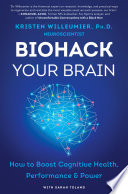

The concept of neuroplasticity is central to understanding how we can enhance brain function. Neuroplasticity refers to the brain's ability to reorganize itself by forming new neural connections throughout life. This means that our brains are not static; they can grow and adapt in response to new experiences, learning, and even healing from injuries. The book emphasizes techniques that promote neuroplasticity, such as engaging in lifelong learning, practicing mindfulness, and maintaining a healthy lifestyle. By understanding and harnessing neuroplasticity, individuals can improve cognitive function, enhance memory, and potentially fend off age-related cognitive decline. The author provides practical exercises that readers can incorporate into their daily routines to stimulate brain growth and improve overall mental health.
Continue readingNutrition plays a pivotal role in brain health, and the book delves into the specific nutrients that support cognitive function. It highlights the importance of a balanced diet rich in antioxidants, healthy fats, vitamins, and minerals. Foods such as fatty fish, berries, nuts, and leafy greens are discussed for their neuroprotective properties. The author explains how certain diets, like the Mediterranean diet, can enhance brain function and reduce the risk of neurodegenerative diseases. Additionally, the book addresses the impact of processed foods and sugar on mental clarity and emotional well-being. By adopting a brain-healthy diet, individuals can optimize their cognitive performance and maintain mental agility as they age.
Continue readingSleep is often overlooked in discussions about brain health, yet it is one of the most critical factors for cognitive function. The book details how sleep facilitates memory consolidation, emotional regulation, and overall brain health. It explores the stages of sleep and their respective roles in cognitive processes. The author provides insights into sleep hygiene practices, such as creating a conducive sleep environment, establishing a regular sleep schedule, and limiting screen time before bed. By prioritizing sleep and understanding its significance, readers can enhance their cognitive abilities, improve mood, and increase productivity.
Continue readingThe practice of mindfulness is presented as a powerful tool for enhancing mental resilience and cognitive function. The book discusses how mindfulness meditation can reduce stress, improve focus, and increase emotional intelligence. It provides practical techniques for incorporating mindfulness into daily life, such as mindful breathing, body scans, and gratitude practices. The author emphasizes that cultivating mindfulness not only benefits brain health but also fosters a greater sense of well-being and emotional stability. By developing a mindfulness practice, individuals can better manage stressors and enhance their overall cognitive performance.
Continue readingPhysical exercise is not only vital for physical health but also plays a significant role in enhancing brain function. The book outlines the neurological benefits of regular physical activity, such as increased blood flow to the brain and the release of neurotrophic factors that promote neuron growth. The author advocates for various forms of exercise, including aerobic activities, strength training, and even brief bouts of movement throughout the day. The book also discusses the concept of 'exercise snacks,' short bursts of activity that can boost cognitive performance. By incorporating regular exercise into their routines, readers can improve their cognitive abilities, mood, and overall brain health.
Continue readingIn a digital age, the book addresses the dual-edged sword of technology's impact on cognition. It discusses how excessive screen time and constant digital distractions can impair attention, memory, and overall cognitive function. However, it also explores how technology can be harnessed positively, such as through brain-training apps and online learning platforms. The author encourages readers to strike a balance between technology use and engaging in activities that promote deep thinking and focus. By being mindful of their technology consumption, individuals can protect their cognitive health while still benefiting from the advantages of digital tools.
Continue readingThe importance of social connections for cognitive health is a key theme in the book. The author discusses how strong social ties can enhance mental resilience, reduce stress, and even improve longevity. Engaging in meaningful relationships and community activities is emphasized as a way to boost brain health. The book also highlights the cognitive benefits of collaborative learning and group activities. By fostering social connections, individuals can create a supportive environment that not only enhances their cognitive abilities but also enriches their overall quality of life.
Continue readingThe reading time for Biohack Your Brain depends on the reader's pace. However, this concise book summary covers the 7 key ideas from Biohack Your Brain, allowing you to quickly understand the main concepts, insights, and practical applications in around 23 min.
Biohack Your Brain is definitely worth reading. The book covers essential topics including Neuroplasticity and Brain Health, Nutrition's Role in Brain Function, The Importance of Sleep, providing practical insights and actionable advice. Whether you read the full book or our concise summary, Biohack Your Brain delivers valuable knowledge that can help you improve your understanding and apply these concepts in your personal or professional life.
Biohack Your Brain was written by Kristen Willeumier.
If you enjoyed Biohack Your Brain by Kristen Willeumier and want to explore similar topics or deepen your understanding, we highly recommend these related book summaries:
These books cover related themes, complementary concepts, and will help you build upon the knowledge gained from Biohack Your Brain. Each of these summaries provides concise insights that can further enhance your understanding and practical application of the ideas presented in Biohack Your Brain.